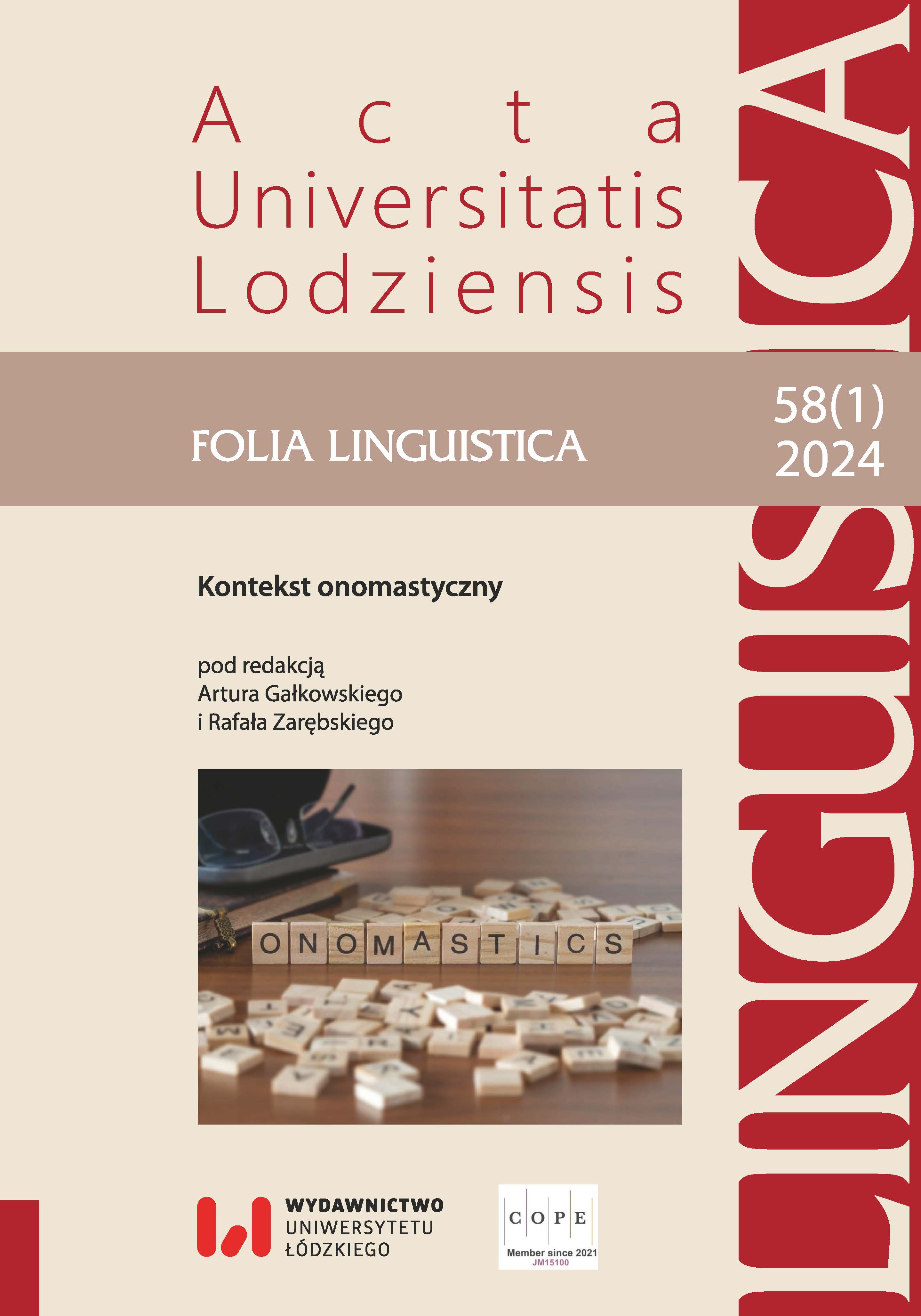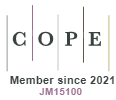Familiar names in Korean – sociolinguistic aspects of communication
DOI:
https://doi.org/10.18778/0208-6077.58.1.07Keywords:
personal names, addressative forms of kinship, family, South KoreaAbstract
The article is a consideration on Korean personal names and addressative forms of kinship, their significance in everyday communication, as well as the linguistic and social functions they perform during the process of forming and developing interpersonal relationships. Family and groups of relatives are particularly important in the processes of formation and change of particular forms – they are the core of naming-related knowledge, traditions and practices. Terms that originally functioned only within a community of blood-related individuals are nowadays in use even when communicating with people outside the family with whom one is on friendly terms – thereby including them in a closer, familiar group. The exceptional characteristics of Korean personal naming and the communicatively used forms of direct expression lead to the conclusion that Koreans are committed to the precise and deliberate expression of thoughts and that the language itself is an essential value to the community.
Downloads
References
Ahn H., 2017, Seoul Uncle: Cultural Conceptualisations Behind the Use of Address Terms in Korean, w: F. Sharifian (red.), Advances in Cultural Linguistics, Singapore: Springer Singapore, s. 411–431.
Google Scholar
DOI: https://doi.org/10.1007/978-981-10-4056-6_19
Encyclopedia of Korean Culture (한국민족문화대백과사전 [Hangungminjongmunhwadaebaekgwasajeon]), https://encykorea.aks.ac.kr/ (dostęp: 17.05.2023).
Google Scholar
Iglewska S., 2015, Aspekty socjolingwistyczne w badaniach procesu ewolucji systemu antroponimicznego: zarys tematu, „Ogrody Nauk i Sztuk” 5, s. 327–330.
Google Scholar
Janicka I., 2009, Komunikacja niewerbalna Koreańczyków na tle tradycji kulturowej. Perspektywa glottodydaktyczna, „Poznańskie Studia Polonistyczne. Seria Językoznawcza” 15. https://doi.org/10.14746/pspsj.2009.15.1
Google Scholar
DOI: https://doi.org/10.14746/pspsj.2009.15.1
Kałużyńska I., 2014, Aksjologia a chińskie tradycyjne imiona kobiet, „Roczniki Humanistyczne” 62(9). https://doi.org/10.18290/10.18290/rh.2019.67.11-1
Google Scholar
DOI: https://doi.org/10.18290/10.18290/rh.2019.67.11-1
Kałużyńska I., 2015, Traditional Chinese generation names, „Onomastica” 59, http://rcin.org.pl/ijp/Content/57724/PDF/6.%20Kaluzynska.pdf (dostęp: 2.12.2020).
Google Scholar
Kałużyńska I., 2020, Nazwotwórstwo w języku chińskim, „Onomastica” 64, https://rcin.org.pl/ijp/publication/196864 (dostęp: 10.03.2021).
Google Scholar
DOI: https://doi.org/10.17651/ONOMAST.64.8
Kim J.R., Jung J.E., Lee E., 2016, Standard Korean Grammar for Foreigners, Seoul: Pagijong Press.
Google Scholar
Korean Names Information, https://baby-name.kr/en/ (dostęp: 17.05.2023).
Google Scholar
Lisowski T., 2007, Determinizm kulturowy a leksyka. Pięć powinności konfucjańskich a koreańskie nazwy stopni pokrewieństwa, w: J. Kamper-Warejko, I. Kaproń-Charzyńska (red.), Z zagadnień leksykologii i leksykografii języków słowiańskich, Toruń: Uniwersytet Mikołaja Kopernika.
Google Scholar
NAVER 사전 [sajeon], https://dict.naver.com/ (dostęp: 17.05.2023).
Google Scholar
Pak H., 2011, Antroponimy w „Quo Vadis” Henryka Sienkiewicza i w koreańskich przekładach powieści. Ocalone czy stracone w tłumaczeniu?, praca doktorska, Poznań: Uniwersytet Adama Mickiewicza, https://repozytorium.amu.edu.pl/items/581df9c8-3050-4e51-9edf-7c5d79756611 (dostęp: 23.05.2023).
Google Scholar
Pak H., 2020, Nazwy osobowe znaczące w koreańskich serialach telewizyjnych. Ich rodzaje i funkcje (na wybranych przykładach autorstwa scenarzystki Moon Young-nam), w: A. Hryceniak, K. Zielińska-Nowak (red.), Językoznawcza strona popkultury, Wrocław: Stowarzyszenie Badaczy Popkultury i Edukacji Popkulturowej „Trickster”.
Google Scholar
Park I.H., Cho L.-J., 1995, Confucianism and the Korean Family, „Journal of Comparative Family Studies” 26(1), s. 117–134.
Google Scholar
DOI: https://doi.org/10.3138/jcfs.26.1.117
Przybylska A., 2023a, Antroponimia koreańska – kontekst kulturowo-prawny, w: R. Łapa, M. Graf, Ł. Piosik (red.), Człowiek – Język – Prawo, Poznań: Wydawnictwo Poznańskie Studia Polonistyczne.
Google Scholar
Przybylska A., 2023b, Socjokulturowe aspekty komunikacyjne adresatywnych form pokrewieństwa w koreańskim społeczeństwie, w: M. Śleziak, J. Krzywdziński, K. Wabnic (red.), Kuluary. Prace o języku i literaturze. Zeszyt II, Wrocław: Wydawnictwo Quaestio, http://quaestio.com.pl/kuluary-prace-o-jezyku-i-literaturze-zeszyt-ii-p-129.html (dostęp: 1.04.2023).
Google Scholar
Sarnowska-Giefing I., 2016, Ślady dyfuzji kulturowej w antroponimii Poznania w XVI–XVIII wieku, „Onomastica” 60, s. 107–118. https://doi.org/10.17651/ONOMAST.60.7
Google Scholar
DOI: https://doi.org/10.17651/ONOMAST.60.7
Seth M.J., 2010, A History of Korea: From Antiquity to the Present, Lanham: Rowman & Littlefield Publishers.
Google Scholar
Sohn H. (red.), 2005, Korean Language in Culture and Society, Honolulu: University of Hawai’i Press.
Google Scholar
TTMIK (TalkToMeInKorean), 2017, How Korean Names Work [TalkToMeInKorean], https://www.youtube.com/watch?v=Wp6v1OSCdJ8 (dostęp: 15.09.2021).
Google Scholar
You C.I., 2020, Systemy adresatywne Korei Południowej i Polski jako składnik etykiety na przykładzie sfery akademickiej i biznesowej, praca doktorska, Katowice: Uniwersytet Śląski, https://rebus.us.edu.pl/bitstream/20.500.12128/16495/1/You_Systemy_adresatywne_Korei_Poludniowej_i_Polski_jako_skladnik_etykiety.pdf (dostęp: 14.03.2021).
Google Scholar
Downloads
Published
Versions
- 10-07-2024 (2)
- 29-05-2024 (1)
How to Cite
Issue
Section
License

This work is licensed under a Creative Commons Attribution-NonCommercial-NoDerivatives 4.0 International License.










